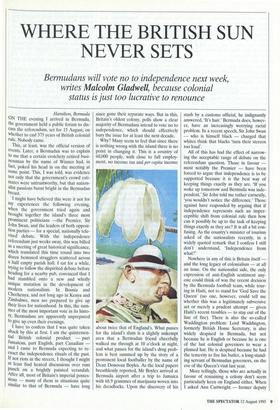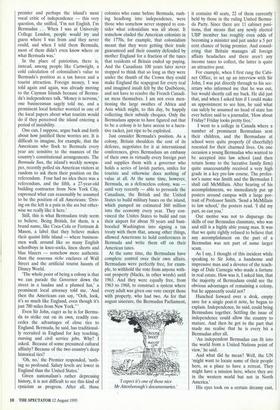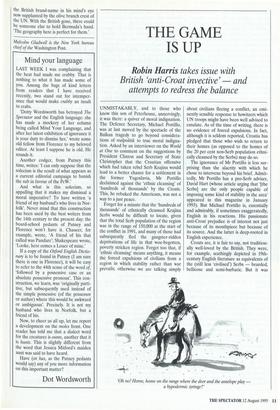WHERE THE BRITISH SUN NEVER SETS
Bermudans will vote no to independence next week,
writes Malcolm Gladwell, because colonial
status is just too lucrative to renounce
Hamilton, Bermuda ON THE evening I arrived in Bermuda, the government held a public forum to dis- cuss the referendum, set for 15 August, on whether to end 375 years of British colonial rule. Nobody came. This, at least, was the official version of events. Later, a Bermudan was to explain to me that a certain crotchety retired busi- nessman by the name of Winnes had, in fact, poked his head in on the meeting at some point. This, I was told, was evidence not only that the government's crowd esti- mates were untrustworthy, but that nation- alist passions burnt bright in the Bermudan breast.
I might have believed this were it not for my experiences the following evening, when the government tried again and brought together the island's three most prominent politicians —the Premier, Sir John Swan, and the leaders of both opposi- tion parties — for a special, nationally tele- vised debate. With the independence referendum just weeks away, this was billed as a meeting of great historical significance, which translated this time round into two dozen bemused stragglers scattered across a half empty parish hall. I sat for a while, trying to follow the dispirited debate before heading for a nearby pub, convinced that I had stumbled onto a new and wholly unique mutation in the development of modern nationalism. In Bosnia and Chechenya, and not long ago in Kenya and Zimbabwe, men are prepared to give up their lives for nationhood. In this, the sum- mer of the most important vote in its histo- ry, Bermudans are apparently unprepared to give up even their evenings.
I have to confess that I was quite taken aback by this at first. I am the quintessen- tial British colonial product — part Jamaican, part English, part Canadian and I came to Bermuda expecting to re- enact the independence rituals of the past. If not riots in the streets, I thought I might at least find heated discussions over rum punch on a brightly painted verandah. After all, most of Britain's imperial posses- sions — many of them in situations quite similar to that of Bermuda — have long since gone their separate ways. But in this, Britain's oldest colony, polls show a clear majority of Bermudans intend to vote no to independence, which should effectively bury the issue for at least the next decade.
Why? Many seem to feel that since there is nothing wrong with the island there is no point in changing it. This is a country of 60,000 people, with close to full employ- ment, no income tax and per capita income about twice that of England's. What passes for the island's slum is a slightly unkempt area that a Bermudan friend cheerfully walked me through at 10 o'clock at night, and what passes for the island's drug prob- lem is best summed up by the story of a prominent local footballer by the name of Dean Donovan Boyles. As the local papers breathlessly reported, Mr Boyles arrived at Bermuda airport after a trip to Jamaica with 68.9 grammes of marijuana woven into his dreadlocks. Upon the discovery of his stash by a customs official, he indignantly answered, 'It's hair.' Bermuda does, howev- er, have an increasingly worrying racial problem. In a recent speech, Sir John Swan — who is himself black — charged that whites think that blacks 'turn their stereos too loud'.
All of this has had the effect of narrow- ing the acceptable range of debate on the referendum question. Those in favour most notably the Premier — have been forced to argue that independence is to be supported because it is the best way of keeping things exactly as they are. 'If you woke up tomorrow and Bermuda was inde- pendent,' Sir John told me rather earnestly, `you wouldn't notice the difference.' Those against have responded by arguing that if independence represents such an imper- ceptible shift from colonial rule then how can it possibly be up to the task of keeping things exactly as they are? It is all a bit con- fusing. As the country's minister of tourism asked of the nationalists recently, in a widely quoted remark that I confess I still don't understand, 'Independence from what?'
Nowhere in any of this is Britain itself and the long legacy of colonialism — at all an issue. On the nationalist side, the only expression of anti-English sentiment any- one could think of was the recent decision by the Bermuda football team, while tour- ing in Haiti, not to stand for 'God Save the Queen' (no one, however, could tell me whether this was a legitimately subversive act or merely a prudent attempt — given Haiti's recent troubles — to stay out of the line of fire). There is also the so-called Waddington problem: Lord Waddington, formerly British Home Secretary, is also widely despised in Bermuda, but not because he is English or because he is one of the last colonial governors to wear a plumed hat. He is despised because he had the temerity to fire his butler, a long-stand- ing servant of Bermudan governors, on the eve of the Queen's visit last year.
More tellingly, those who are actually in favour of remaining a colony don't seem particularly keen on England either. When I asked Ann Cartwright — former deputy premier and perhaps the island's most vocal critic of independence — this very question, she sniffed, `I'm not English. I'm Bermudan . . . When I was at University College London, people would try and guess where I was from and they never could, and when I told them Bermuda, most of them didn't even know where or what Bermuda was.'
In the place of patriotism, there is, instead, among people like Cartwright, a cold calculation of colonialism's value to Bermuda's position as a tax haven and a tourist attraction. Foreign money, I was told again and again, was already moving to the Cayman Islands because of Bermu- da's independence talk. 'Money is nervous,' one businessman sagely told me, and a prominent local hotelier worried in one of the local papers about what tourists would do if they perceived the island entering a period of instability.
One can, I suppose, argue back and forth about how justified these worries are. It is difficult to imagine, for example, that the Americans who flock to Bermuda every year are sensitive to the nuances of the country's constitutional arrangements. The Bermuda Sun, the island's weekly newspa- per, recently polled six American visitors at random to ask them their position on the referendum. Four had no idea there was a referendum, and the fifth, a 27-year-old building contractor from New York City, expressed what can reasonably be assumed to be the position of all Americans: 'Driv- ing on the left is a pain in the ass but other- wise we really like it here.'
Still, this is what Bermudans truly seem to believe. Being British, for them, is a brand name, like Coca-Cola or Fortnum & Mason, a label that they believe makes their quaint little island — where business- men walk around like so many English schoolboys in knee-socks, linen shorts and blue blazers — somehow more authentic than the nouveau riche enclaves of Wall Street and the artificial tourist haunts of Disney World.
`The whole point of being a colony is that we can parade the Governor down the street in a landau and a plumed hat,' a prominent local attorney told me. 'And then the Americans can say, "Ooh, look, it's so much like England, even though it's just 700 miles from New York."' Even Sir John, eager as he is for Bermu- da to strike out on its own, readily con- cedes the advantages of close ties to England. Bermuda, he said, has traditional- ly recruited in England for key teaching, nursing and civil service jobs. Why? I asked. Because of some presumed cultural affinity? Because of the two country's deep historical ties?
'Oh, no,' the Premier responded, 'noth- ing so profound. Salary levels are lower in England than the United States.'
Given nationalism's rather depressing history, it is not difficult to see this kind of cynicism as progress. After all, those colonies who came before Bermuda, rush- ing headlong into independence, were those who somehow never stopped to con- sider what colonialism was all about. It somehow eluded the American colonists in the 1770s, for example, that colonialism meant that they were getting their trade guaranteed and their country defended by mother England for a fraction of the taxes that residents of Britain ended up paying. And the Canadians 100 years later never stopped to think that so long as they were under the thumb of the Crown they could make England the scapegoat for every real and imagined insult felt by the Quebecois, and not have to resolve the French Canadi- an mess themselves. I am not even men- tioning the large swathes of Africa and Asia which might, to this day, be happily collecting their subsidy cheques. Only the Bermudans appear to have figured out that to be a colony is to have access to a lucra- tive racket, just ripe to be exploited.
Just consider Bermuda's position. As a colony, Britain shoulders the cost of its defence, negotiates for it at international conferences, gives Bermudans an embassy of their own in virtually every foreign port and supplies them with a governor who holds a series of lavish parties, smiles for tourists and otherwise does nothing of value at all. At the same time, however, Bermuda, as a defenceless colony, was until very recently — able to persuade the Canadians, the British and the United States to build military bases on the island, which pumped an estimated 560 million into the economy every year. They con- vinced the Unites States to build and run their airport for about 50 years and bam- boozled Washington into signing a tax treaty with them that, among other things, allowed Americans to hold conferences in Bermuda and write them off on their American taxes.
At the same time, the Bermudans have complete control over their own affairs. Bermudans were perfectly free, for exam- ple, to withhold the vote from anyone with- out property (blacks, in other words) until 1963. And they were equally free, from 1963 to 1968, to construct a system where every adult was given one vote except those with property, who had two. As for that august sinecure, the Bermudan Parliament, 'I expect it's one of those nice Mr Attenborough's documentaries.' it contains 40 seats, 22 of them currently held by those in the ruling United Bermu- da Party. Since there are 11 cabinet posi- tions, that means that any newly elected UBP member has roughly even odds of becoming a minister and just under a 5 per cent chance of being premier. And consid- ering that Britain manages all foreign affairs headaches and there aren't any income taxes to collect, the latter is quite an attractive post.
For example, when I first rang the Cabi- net Office, to set up an interview with Sir John, I was put directly through to his sec- retary who informed me that he was out, but would shortly call me back. He did just that, and when I asked him if I could make an appointment to see him, he said what can safely be assumed no head of state has ever before said to a journalist, 'How about Friday? Friday looks pretty free.'
I went to a college in Canada where a number of prominent Bermudans sent their children, and the Bermudans at school were quite properly (if cheerfully) resented for their charmed lives. On one occasion a young Bermudan who wanted to be accepted into law school (and then return home to the lucrative family firm) quite unaccountably received a very high grade in a key pre-law course. The profes- sor's name was Smith and the Bermudan I shall call McMillain. After hearing of his accomplishments, we immediately put up posters around campus with a large por- trait of Professor Smith. 'Send a McMillain to law school,' the posters read. 'I did my part, so can you.'
Our motive was not to disparage the skills of our Bermudan classmate, who was and still is a highly able young man. It was that we quite rightly refused to believe that any accomplishment on the part of a Bermudan was not part of some larger scam.
As I say, I thought of this incident while speaking to Sir John, a handsome and impressive man and a devotee of the teach- ings of Dale Carnegie who made a fortune in real estate. How was it, I asked him, that the majority of Bermudans could see the obvious advantages of remaining a colony, but he apparently could not?
Hunched forward over a desk, empty save for a single post-it note, he began to explain. Independence, he said, could bring Bermudans together. Settling the issue of independence could allow the country to mature. And then he got to the part that made me realise that he is every bit a Bermudan after all.
'An independent Bermudan can fit into the world from a United Nations point of view,' he said.
And what did he mean? Well, the UN `might want to locate some of their people here, as a place to have a retreat. They might have a mission here, where they are in the western world but not in North America.'
His eyes took on a certain dreamy cast, the British brand-name in his mind's eye now supplanted by the olive branch crest of the UN. With the British gone, there could be someone else to hold Bermuda's hand. `The geography here is perfect for them.'
Malcolm Gladwell is the New York bureau chief of the Washington Post.




















































 Previous page
Previous page